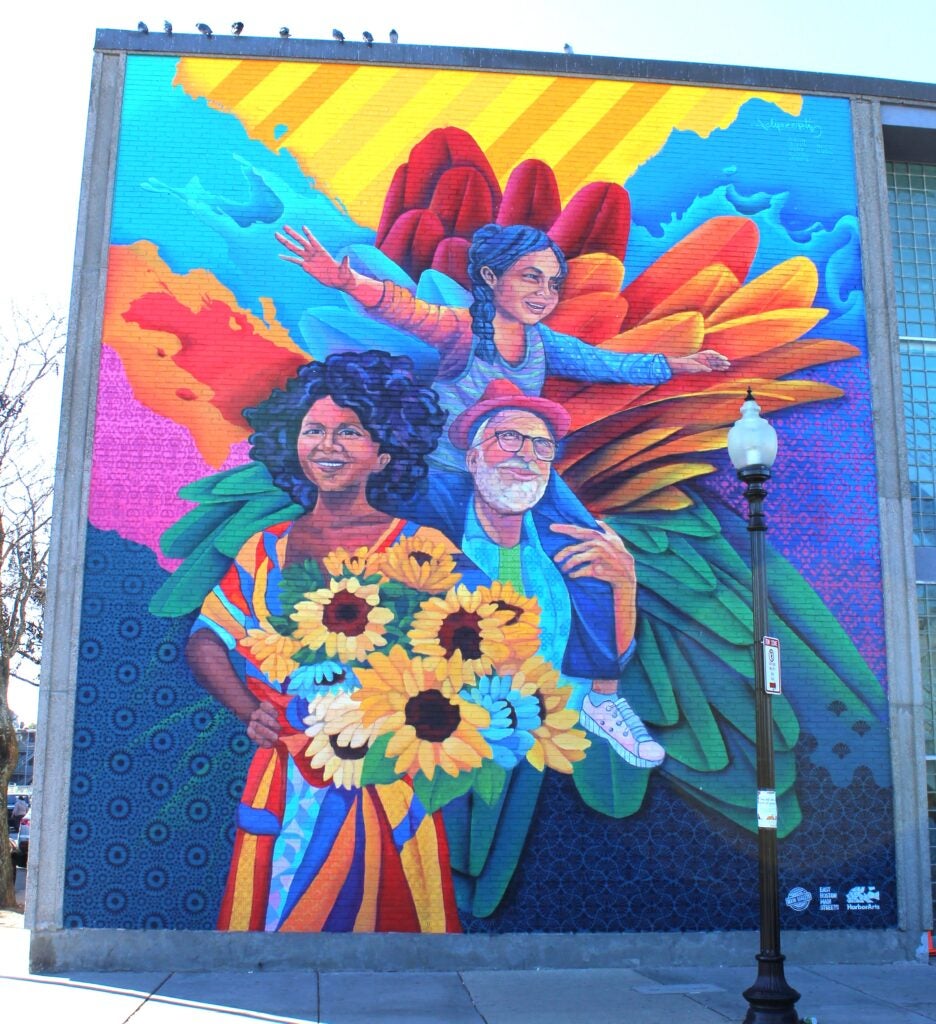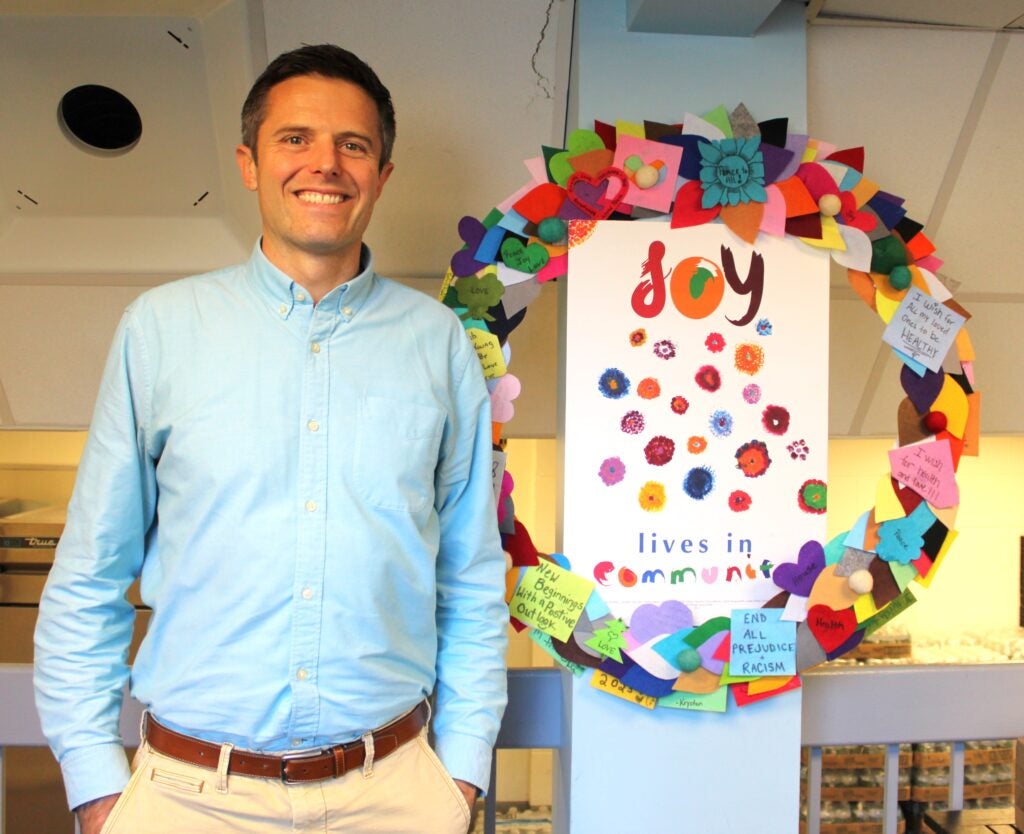The East Boston Social Centers: A Catalyst for Community Belonging and Joy
As part of Center Director K. “Vish” Viswanath’s initiative to promote community well-being and health equity, the Lee Kum Sheung Center for Health and Happiness has begun working with the East Boston community. Originally a collection of five islands, East Boston is separated from the rest of the city by an inlet of Boston Harbor. This diverse urban neighborhood is home to more than 43,000 residents, many of whom are immigrants from Central and South America. Members of the East Boston community face numerous challenges, ranging from housing shortages and environmental pollution, to lack of access to food and educational programs.
However, East Boston also has important assets. For example, the community is served by the East Boston Social Centers, which were founded more than a hundred years ago to welcome and support immigrant families through early education programs and public health and social services. Today, the Social Centers continue this important work under the leadership of Executive Director Justin Pasquariello.

Motivated by his own experience in the foster care system, Justin Pasquariello started his career by founding Silver Lining Mentoring, a nonprofit which provides mentorship for foster and adopted youth. He went on to earn his MBA at Harvard Business School and MPA at Harvard Kennedy School, and worked at a variety of nonprofits, including serving for five years as Executive Director of Children’s HealthWatch. “I feel like I’ve been on a winding path trying to get to a place where my passions, what I can bring to the world, and the kind of work that I want to do all intersect,” expounded Mr. Pasquariello. “And this is that place.”

“East Boston Social Centers is a catalyst for community belonging and joy,” he declared. “We’re a place where people of all ages and backgrounds can feel a sense of belonging.” The Social Centers have a wide variety of programs which support East Boston residents from birth to old age.
- Early Learners Program (ages 2 months to 5 years)
- Bright Minds Program (ages 5-14)
- Thriving Teens Program (ages 4-19)
- Active Adults Program (ages 55+)
A few examples of other community and family services are included below.
- Welcome Baby Program: members of the Active Adults Program knit hats and blankets for babies born in the community
- Family Engagement Network: provides outreach to families and connects parents with leadership opportunities
- Every Child Shines Program: bolsters kindergarten readiness
- English Language Learners Program: helps immigrants with their English proficiency
- Joyful Eastie Website: developed by local teens to share tips on how to spread positivity
In all their initiatives, the Social Centers seek to promote community joy. “At the East Boston Social Centers, we recognize that joy lives in community,” explained Mr. Pasquariello. He cited a paper by the Framingham Heart Study, which found that if the happiness of a friend of a friend of a friend increases and that person lives within a mile, then your happiness is likely to increase. “Happiness is more contagious than sadness,” Mr. Pasquariello asserted. “And when we support the happiness of our neighbors, we support our own happiness and well-being.”
Mr. Pasquariello defines joy in terms of five pillars: relationships, purpose, fitness, mindfulness, and fun. “We are still pretty early on in our work to increase joy in community,” he explained, “but we know what matters most.”

The East Boston Social Centers’ focus on community joy sparked a partnership with the Lee Kum Sheung Center for Health and Happiness. This collaboration is part of an initiative led by Center Director Dr. K. “Vish” Viswanath to promote health equity through the translation of well-being knowledge to local communities. Now, Center Research Assistant and Harvard T.H. Chan Master of Public Health graduate Elaine Jeon (pictured left) is working with the Social Centers to support evaluation efforts as part of their intervention on community joy.
“We need to better understand from both a qualitative and quantitative perspective what is happening in the community, and so that research partnership makes an important difference,” said Mr. Pasquariello. “The question of how we significantly increase joy at a community level is something we don’t have all the answers to, and that’s why we’re really grateful to have partners at the Center for Health and Happiness. I think this can be a real model of how academia and communities can work together to solve problems on the ground.”
In addition to conducting research with the Lee Kum Sheung Center for Health and Happiness, the Social Centers have partnered with the Shah Family Foundation and MassINC on Boston’s first citywide survey about joy. You can read about the results of the survey here.

Mr. Pasquariello has ambitious plans for the future of joy in East Boston. He outlined plans to host a Community Joy Summit, bringing together academic and community leaders to review the data gathered by the Social Centers and formulate a shared strategy. Additionally, he detailed his plans for the Joy Ambassador Program, a micro-entrepreneurship program focused on joy. This initiative would encourage individuals to launch small-scale, evidence-based projects promoting community joy, followed by an evaluation of their effectiveness. As an example, Mr. Pasquariello mentioned a community dinner program that could enhance food access and foster socialization. “What we want to do is democratize joy,” emphasized Mr. Pasquariello, “So that anyone can access it, no matter who they are.”
The East Boston Social Centers are undertaking noteworthy efforts and have plans to further expand these initiatives as resources permit. So, what can members of the public do to contribute?
According to Justin Pasquariello, researchers, public health professionals, and policymakers all have important roles to play. Researchers can collaborate with the Social Centers to conduct additional research into the question of how to build joy in communities; and public health professionals can partner with policymakers to devise new and creative ways to utilize health care funding and integrate joy in the development of new policies.
Mr. Pasquariello emphasized that joy should be at the center of policymaking, arguing, “I think we should score policies by considering whether, on net, is this going to increase joy and well-being or is this going to subtract from it?” He proposed that policymakers design communities in ways that allow people to more easily to pursue in-person relationships, find a sense of purpose, engage in fitness, and generally “make joy the downhill path.”
You can support the East Boston Social Centers in their work to promote community joy by donating or volunteering, or discuss potential partnerships by reaching out to Justin Pasquariello directly at jp@ebsoc.org. As the Social Centers slogan reads, “when all give, all gain.”
Written by Ayla Fudala, Center Communications Coordinator